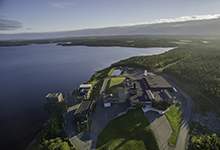World Water Week: August 23-27, 2021

The City of St. John’s is committed to providing a high-quality water service that is safe and sustainable.
Every bit of water we use must be treated and that takes time, money and expertise. We all have a role to play in using water wisely for our own health and well-being, the environment and for wise use of City finances and resources.
In recognition of World Water Week we are highlighting some of how the City provides and maintains the regional water service, and some ways residents can wisely use water.
Water Treatment Facilities
The water we drink in St. John’s has been recognized as some of the best in the world.
To reach that standard, it is regularly tested and meets or exceeds the guidelines set out in the Canadian Drinking Water Standards. Water samples are collected daily from sites throughout the distribution system and are taken to the provincial Public Health Laboratory for testing including for total coliform and E.coli.
The City's division of Water and Wastewater in the Department of Public Works is a member of the Atlantic Canada Chapter of the American Water Works Association, the largest organization of water supply professionals in the world.
Hydrant Flushing
Fire hydrants are strategically opened as part of water quality maintenance. Water pipes need to be occasionally flushed to ensure they are free of sediment. Fire hydrants are opened and flushed to ensure the drinking water coming out of your tap is clean and safe to drink.
Leak Detection
The City has a leak detection program to find leaks in watermains and fire hydrants and can also locate leaks in residential water service pipes. Leaking water is a waste of treated, drinking water and can pose a risk of flooding and property damage. Each year staff check over 600 km of watermains and more than 3,000 fire hydrants for leaks. In 2020 we discovered 367 leaks in the system that required repair.
Pool & Hot Tub draining
Water drained from swimming pools and hot tubs may contain pool disinfectant chemicals which can be harmful to the natural environment. Homeowners can reduce that risk by taking certain steps. Further information about proper draining is available here.
Catch Basins
The catch basins on your street collect water in the storm sewer and drains untreated into a stream, river or other nearby water body, that acts as natural infrastructure before it reaches the ocean.
Only water and storm water runoff are to go into catch basins – do not dispose of garbage such as filled dog-poop bags into catch basins as they end up in a neighbourhood stream and/or other water body.
Water Conservation
Since 2002 a Water Conservation Order has been in place to ensure wise water use, especially during the summer when outdoor water consumption increases.
When to water your lawn with a sprinkler:
- Even house number: Tuesday and Saturday, 6-8 a.m. and 8-10 p.m.
- Odd house number: Thursday and Sunday, 6-8 a.m. and 8-10 p.m.
